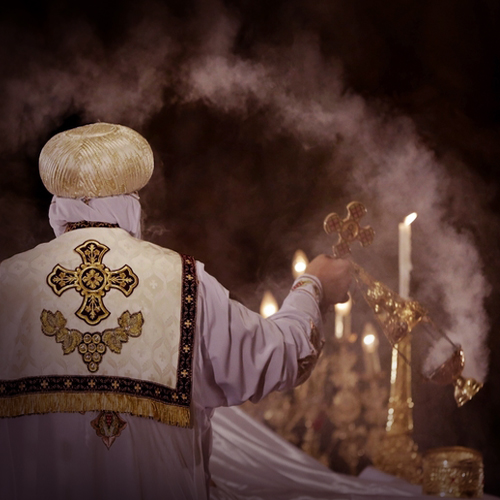Question: At the conclusion of the Divine Liturgy, the priest sprinkles the faithful with water, and afterward distributes the eulogia, or holy bread. What is the benefit of the water and the Qorban (Oblation), and is this rite biblical, i.e. does it arise from a verse in the Bible? And what is its importance?
The Holy Liturgy is a sacrifice, and the mystery of the Oblation has many meanings, and we consider the mystery of the Oblation to be heavenly sustenance and spiritual nourishment. The mystery of the Oblation is considered to also be a mystery of communion, as it is our communion with Christ and communion with the believers. It also is considered to be a sacrifice because it refers to the sacrifice of the Cross, as there is no salvation without Christ and the Cross. In baptism, we are forgiven from the ancestral sin, but there are practical, daily sins that man commits every single day.How are these daily sins forgiven? The sin of our father Adam required that Christ come and die a death of redemption, instead of man. Therefore, in every sin that we commit, we repeat from the beginning the sin of the first Adam. The situation thus requires the blood of Christ every time man commits a practical sin. So, after baptism, in which we are forgiven the ancestral sin, and any other sins prior to baptism (i.e. in the case of older catechumens being baptized), they are remitted for us in the baptismal font.


We are partakers of this New Covenant, and after being baptized, we are continuously in need of Communion. This is why it is necessary for the believer to partake in frequency and with fear of the Holy Mysteries, from one point of view to be saved from the divine flame, and from another perspective, in order to abound in grace. We, in the sacrament of Communion, are washed in the bloodof Christ, and in it, we wash away our practical sins that we condemn ourselves with after baptism, and these are the daily sins.
The Liturgy then is a sacrifice, and Christ Himself in the offering of the Liturgy is this sacrifice. This is the greatness of the sacrament of Communion: that we have an altar, which St. Paul the Apostle speaks about, when he says, “We have an altar from which those who serve the tabernacle [namely the Jews] have no right to eat” (Hebrews 13:10), and the fact that we have an altar means that there must be a sacrifice upon it. What is this sacrifice? It is Christ Himself. So every time the Holy Liturgy is celebrated, Christ is the sacrifice. Because of this, when the priest breaks the bread, he breaks it in a certain way in order to portray Christ as a sacrifice: the head facing the priest and the feet facing the east side, elevated as a sacrifice. After the priest finishes the Liturgy, the believers partake of this sustenance for their spirits and nourishment for their souls and spiritual manna (for the mind) which surpasses into the eternal life.. Thus, we say, “Give us this day our daily bread.” Our daily bread comprises the essentials that we take with us in our transcendence to the age to come, for in that other world we will live off of Christ, for He is the vine and we are the branches, and there is no life to the branches except through the vine.
In this world to come, He is our nourishment, for who is the one who will give us eternal life and how can we obtain it, unless we receive it from the vine? Eternal life is in Christ exclusively. God is the Eternal, and there is no other one who is eternal, and who can give us eternal life other than the Eternal? From here, we see that our eternal life will be dependent on our nourishment in the world to come. We are nourished by Christ. Through Him, we live and move and exist. In our current, temporal life on earth, we also receive from him life, and we see this again in the phrase, “Give us this day, the bread of the morrow”. This wording is recorded in the words of Christ in the Gospel of St. Luke in the original Coptic as “Pen Oik Ethneyou”, which means “bread of the morrow”, which we ask Christ to “give us day by day”. So, give us our bread, O Christ, which is what we will take with us when we depart to the other life! On earth, we take from Christ the sustenance for our spirits and the nourishment for our souls, for, “unless you eat the flesh of the Son of Man and drink His blood, you have no life in you [your souls]” (John 6:53). Christ says, “I am the living bread which came down from heaven. If anyone eats of this bread, he will live forever.” (John 6:51) And He is the one who says, “Unless you eat the flesh of the Son of Man and drink His blood, you have no life in you.” (John 6:53)

As for the eulogia (holy bread), “eulogia” is a Greek word meaning “blessing”, whereas in Coptic “blessing” translates to “esmou”. The priest when he chooses the Lamb chooses from a typically odd number of bread loaves (e.g. the priest could be presented five or seven or nine or three). When presented with these, the priest chooses the best one: one that is unblemished from all sides. The one that is selected should not have a single impurity, for [Christ] the Lamb has no impurities. The other loaves of bread that were presented with the selected one to become the Lamb received the blessing of being presented with the selected Lamb. This visual rite is just like a group of people who are nominated for a high position (political or religious) and only one person is to be selected to receive the honor of this high position.
Merely being nominated along with the person who receives the high position gives the other nominees a special prominence compared to other people. So, the other six or four loaves of bread obtain a special prominence, in addition to the fact that the priest also blesses them with the sign of the cross with his finger that was dipped in the wine [that is to become the Holy Blood]. These loaves obtain additional blessings above any other normal loaves of bread. The people then who did not get the chance to partake of the Holy Eucharist get to receive the blessings of the eulogia. Even those who partook of the Eucharist take from it as a blessing.This is the idea behind the benefit of the water and the Qorban (Blessing Bread). Is this a tradition or is this biblical? There is no distinction between tradition and scriptural proof in their levels of importance, for tradition also comes to us from the fathers the apostles who are considered pillars of our church. The same also with the Gospels that were passed down to us from our fathers the apostles who wrote them. Thus, we notice that our church tradition has been entrusted to us throughout the generations, going back to the days of the apostles, just as St. Paul the Apostle tells us to “stand fast and hold the traditions which you were taught, whether by word or our epistle” (2 Thessalonians 2:15), for the two are of the same significance.
The Late Bishop Ghreghorious
General Bishop of Theological Post Graduate Studies, Coptic Culture and Scientific Research



